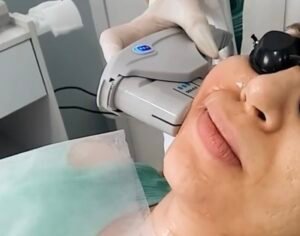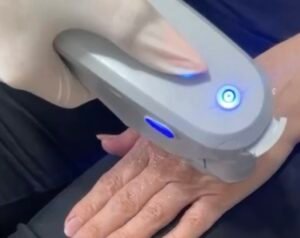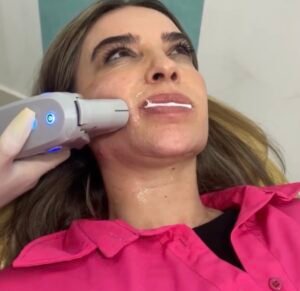HIFU Skin Treatment: An Introduction
In recent years, the field of cosmetic dermatology has witnessed a surge in innovative non-invasive procedures that offer remarkable results without the need for surgery. High-Intensity Focused Ultrasound (HIFU) skin treatment is one such revolutionary option that has gained popularity among individuals seeking youthful, radiant skin. HIFU provides a safe, effective, and non-invasive solution for various skin concerns, including wrinkles and sagging. In this article, we will delve into the world of HIFU skin treatment, understanding its basics, exploring its benefits, and shedding light on its effectiveness and safety.

The Basics of HIFU
HIFU, short for High-Intensity Focused Ultrasound, is a cutting-edge technology that harnesses the power of ultrasound waves to rejuvenate and tighten the skin. Unlike traditional cosmetic procedures that require incisions or injections, HIFU delivers controlled ultrasound energy at specific depths within the skin, targeting the deep structural layers without causing damage to the surface. This ability to penetrate deeper layers sets HIFU apart from other non-invasive treatments.
The Benefits of Non-Invasive HIFU Therapy
One of the key advantages of HIFU therapy is its non-invasiveness. Since HIFU does not require any incisions, anesthesia, or downtime, it is a highly convenient option for individuals with busy lifestyles. Furthermore, HIFU promotes natural collagen production in the skin, helping to restore its elasticity and firmness. The effects of HIFU treatment are gradual and long-lasting, with final results appearing over several months. Unlike surgical procedures, HIFU allows patients to maintain their natural appearance while still achieving noticeable improvements.
How Does HIFU Work on the Skin?
HIFU works by emitting precise ultrasound waves that generate thermal energy. This energy targets specific layers of the skin, stimulating collagen production and tissue contraction. The controlled heat produced during HIFU treatment triggers a regenerative response in the skin, promoting the growth of new collagen fibers. Over time, this leads to improved skin texture, reduced wrinkles, and a more lifted and youthful appearance.

Exploring the Effectiveness of HIFU Treatment
Clinical studies have demonstrated the effectiveness of HIFU treatment in addressing various skin concerns. HIFU has been shown to significantly reduce the appearance of fine lines and wrinkles, improve skin laxity, and enhance overall skin tone. Patients often notice visible improvements in their skin’s texture and tightness following a single session of HIFU treatment. The long-term benefits of HIFU therapy continue to manifest as collagen production is stimulated and the skin progressively rejuvenates over several months.
What Skin Concerns Can HIFU Address?
HIFU is a versatile treatment that can address a range of skin concerns. It is particularly effective in treating sagging skin, including jowls, drooping eyebrows, and loose skin on the neck. HIFU can also improve the appearance of fine lines and wrinkles around the eyes, mouth, and forehead. Additionally, HIFU can be used to tighten and lift skin in other areas of the body, such as the abdomen, thighs, and arms. Its ability to target specific depths within the skin makes HIFU an ideal solution for various aesthetic concerns.
Is HIFU Safe for All Skin Types?
HIFU is considered safe for most skin types, making it an inclusive treatment option for a wide range of individuals. However, it is always recommended to consult with a qualified HIFU provider who can assess your specific skin condition and determine the suitability of the treatment for you. Depending on your unique needs, the provider may adjust the intensity and depth of the ultrasound energy to ensure optimal results while minimizing any potential risks.

The Advantages of Choosing HIFU over Surgical Procedures
Compared to surgical procedures, HIFU offers several advantages that make it an attractive option for individuals seeking skin rejuvenation. Firstly, HIFU is a non-invasive treatment, which means there is no risk of scarring or infection associated with incisions. Additionally, HIFU does not require anesthesia or a long recovery period, allowing patients to resume their daily activities immediately after the treatment. The natural and gradual results achieved with HIFU often surpass those of surgical procedures, creating a more natural and youthful appearance.
Are There Any Side Effects of HIFU?
While HIFU is generally well-tolerated, some individuals may experience mild side effects that typically subside within a few days. These can include temporary redness, slight swelling, and tingling sensations. Rarely, bruising or numbness may occur, but these effects are usually temporary and resolve on their own. It is important to follow the aftercare instructions provided by the HIFU provider to ensure optimal healing and minimize any potential discomfort.
What to Expect During and After HIFU Treatment
During a HIFU session, a handheld device is used to deliver ultrasound waves to the targeted areas of the skin. The treatment is generally well-tolerated, with patients reporting minimal discomfort. After the procedure, there is typically no downtime required, and individuals can resume their daily activities immediately. Some patients may notice immediate improvements in their skin’s appearance, while others may observe gradual enhancements over the following weeks and months as collagen production increases.
How Many Sessions of HIFU are Required?
The number of HIFU sessions required varies depending on the individual’s specific skin concerns and goals. While some individuals may achieve their desired results with a single treatment, others may benefit from multiple sessions spaced several months apart. A qualified HIFU provider can assess your skin condition and recommend the optimal number of sessions required to achieve the desired outcome. Regular maintenance sessions may also be recommended to prolong the results and maintain the rejuvenated appearance of the skin.
Finding a Qualified HIFU Provider
To ensure safe and effective results, it is crucial to choose a qualified HIFU provider who has undergone specialized training in administering HIFU treatments. Research prospective providers, read reviews, and ask for before-and-after photos of previous patients to evaluate their expertise. By selecting a reputable and experienced HIFU provider, you can have confidence in the quality of the treatment and the outcome you desire.
HIFU skin treatment has emerged as a game-changer in the world of cosmetic dermatology, offering a safe and non-invasive solution for various skin concerns. With its ability to stimulate collagen production and tighten sagging skin, HIFU provides remarkable results without the need for surgery or downtime. By understanding the basics, benefits, and effectiveness of HIFU treatment, individuals can make an informed decision about this revolutionary option and find qualified providers who can guide them through the rejuvenation journey. So, why wait? Discover the power of HIFU and unlock a new level of confidence in your skin.
